Sustainable Marketing Report: UK Supermarket Industry Challenges
VerifiedAdded on 2022/12/18
|16
|4200
|4
Report
AI Summary
This report examines sustainable marketing within the UK supermarket industry, using Waitrose & Partners as a case study. It identifies key sustainability issues such as food waste and plastic packaging, analyzing their environmental and economic impacts. The report details Waitrose's efforts to adopt sustainable behaviors, including reducing plastic use and managing food waste through community programs and partnerships. Furthermore, it provides recommendations for the adoption of sustainable practices, emphasizing the importance of consumer engagement, recycling, and the integration of sustainable business models. The report highlights the triple bottom line's relevance and the stakeholder theory's role in achieving sustainable goals, concluding with a call for proactive measures to mitigate environmental impacts and promote responsible business practices within the industry. This report provides students with a comprehensive overview of sustainable marketing strategies and challenges in the retail sector.
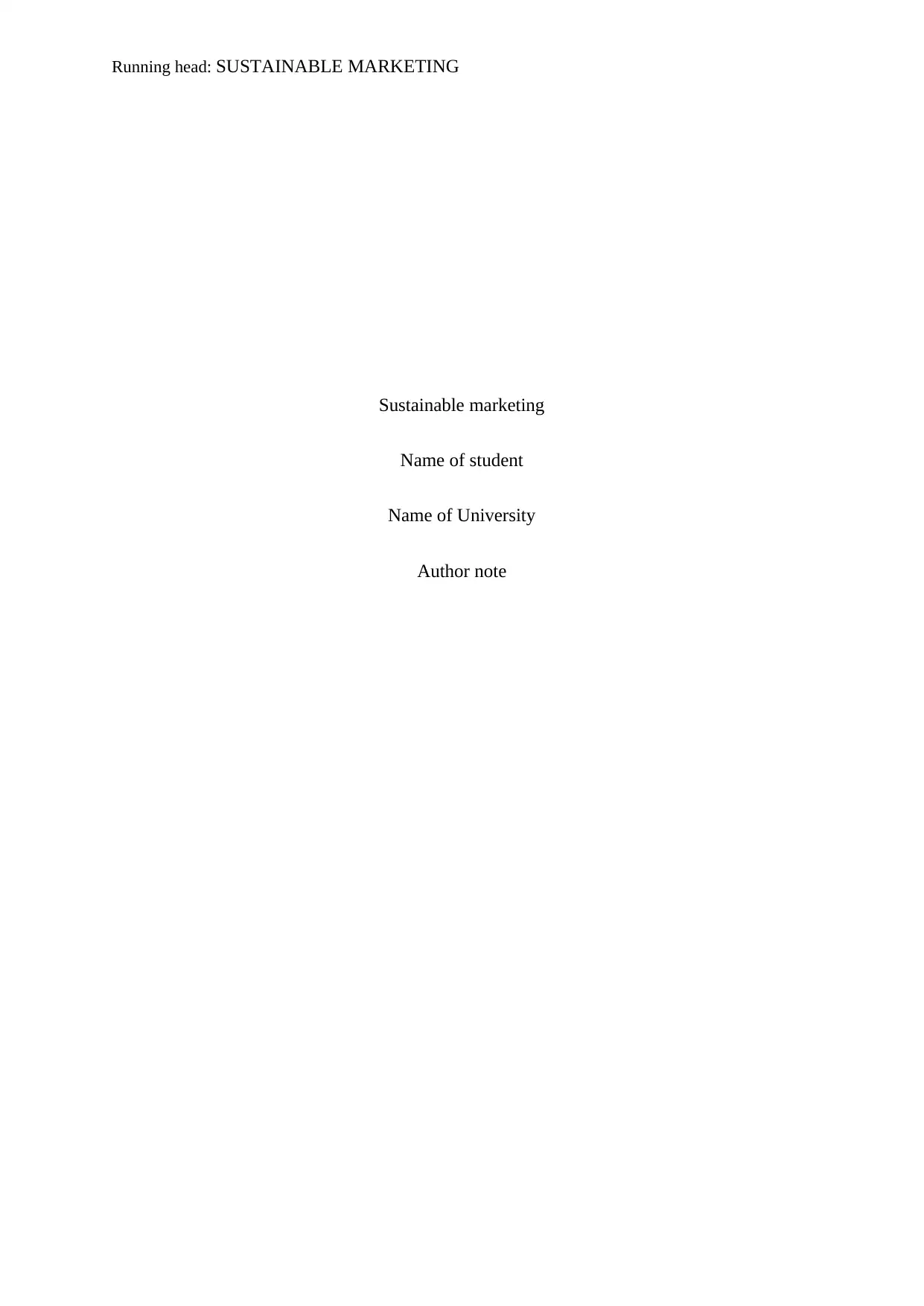
Running head: SUSTAINABLE MARKETING
Sustainable marketing
Name of student
Name of University
Author note
Sustainable marketing
Name of student
Name of University
Author note
Paraphrase This Document
Need a fresh take? Get an instant paraphrase of this document with our AI Paraphraser
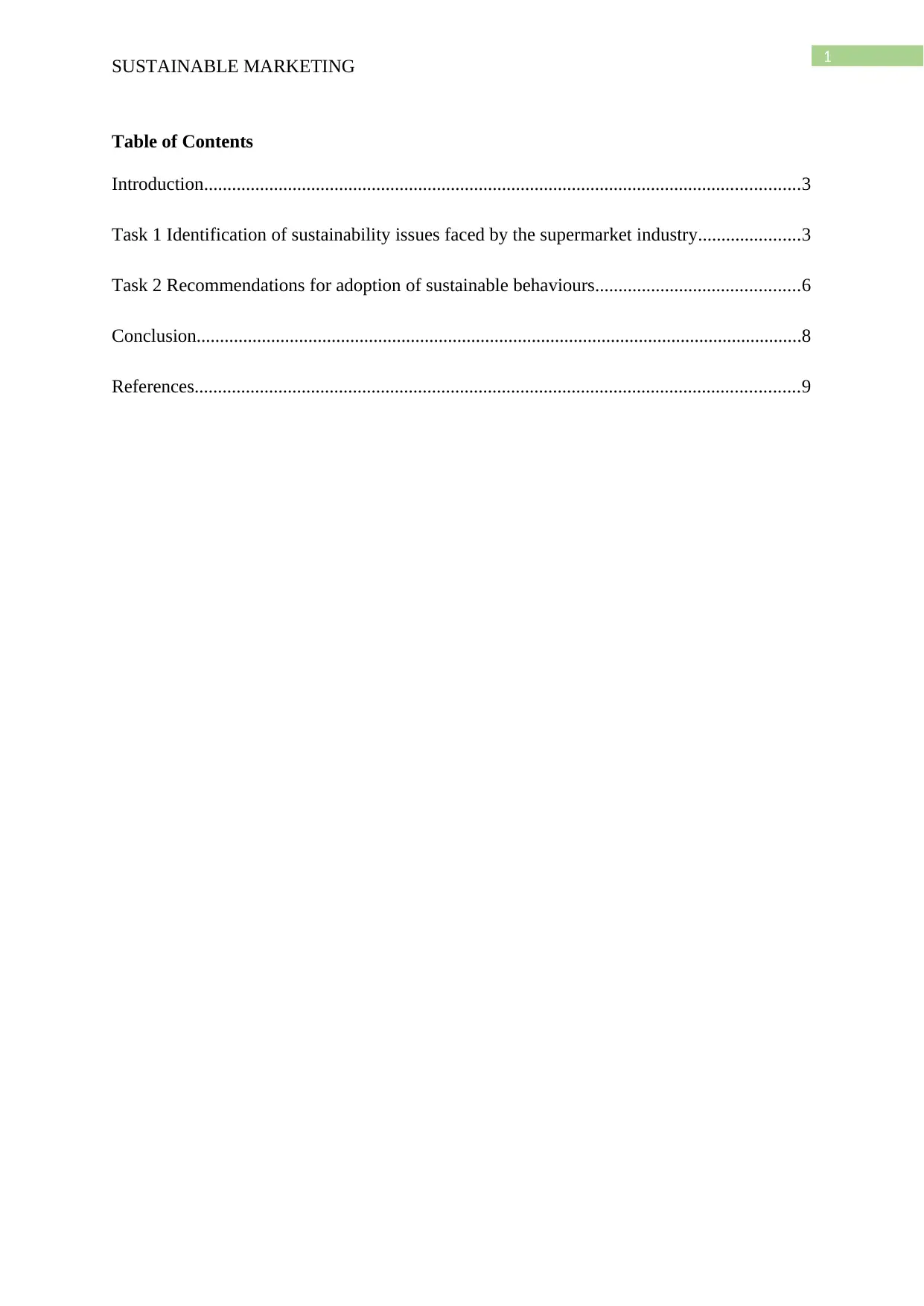
1
SUSTAINABLE MARKETING
Table of Contents
Introduction................................................................................................................................3
Task 1 Identification of sustainability issues faced by the supermarket industry......................3
Task 2 Recommendations for adoption of sustainable behaviours............................................6
Conclusion..................................................................................................................................8
References..................................................................................................................................9
SUSTAINABLE MARKETING
Table of Contents
Introduction................................................................................................................................3
Task 1 Identification of sustainability issues faced by the supermarket industry......................3
Task 2 Recommendations for adoption of sustainable behaviours............................................6
Conclusion..................................................................................................................................8
References..................................................................................................................................9
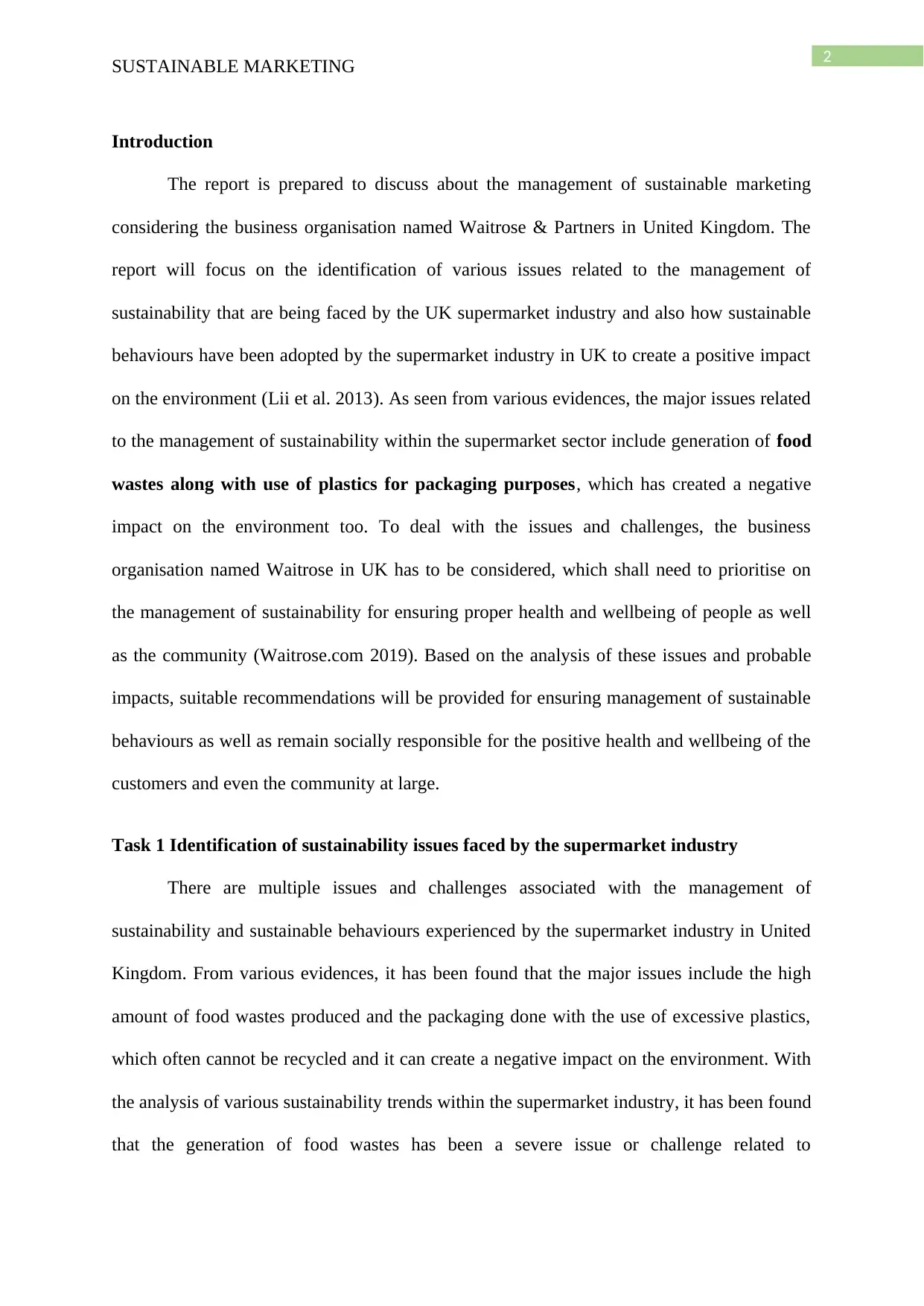
2
SUSTAINABLE MARKETING
Introduction
The report is prepared to discuss about the management of sustainable marketing
considering the business organisation named Waitrose & Partners in United Kingdom. The
report will focus on the identification of various issues related to the management of
sustainability that are being faced by the UK supermarket industry and also how sustainable
behaviours have been adopted by the supermarket industry in UK to create a positive impact
on the environment (Lii et al. 2013). As seen from various evidences, the major issues related
to the management of sustainability within the supermarket sector include generation of food
wastes along with use of plastics for packaging purposes, which has created a negative
impact on the environment too. To deal with the issues and challenges, the business
organisation named Waitrose in UK has to be considered, which shall need to prioritise on
the management of sustainability for ensuring proper health and wellbeing of people as well
as the community (Waitrose.com 2019). Based on the analysis of these issues and probable
impacts, suitable recommendations will be provided for ensuring management of sustainable
behaviours as well as remain socially responsible for the positive health and wellbeing of the
customers and even the community at large.
Task 1 Identification of sustainability issues faced by the supermarket industry
There are multiple issues and challenges associated with the management of
sustainability and sustainable behaviours experienced by the supermarket industry in United
Kingdom. From various evidences, it has been found that the major issues include the high
amount of food wastes produced and the packaging done with the use of excessive plastics,
which often cannot be recycled and it can create a negative impact on the environment. With
the analysis of various sustainability trends within the supermarket industry, it has been found
that the generation of food wastes has been a severe issue or challenge related to
SUSTAINABLE MARKETING
Introduction
The report is prepared to discuss about the management of sustainable marketing
considering the business organisation named Waitrose & Partners in United Kingdom. The
report will focus on the identification of various issues related to the management of
sustainability that are being faced by the UK supermarket industry and also how sustainable
behaviours have been adopted by the supermarket industry in UK to create a positive impact
on the environment (Lii et al. 2013). As seen from various evidences, the major issues related
to the management of sustainability within the supermarket sector include generation of food
wastes along with use of plastics for packaging purposes, which has created a negative
impact on the environment too. To deal with the issues and challenges, the business
organisation named Waitrose in UK has to be considered, which shall need to prioritise on
the management of sustainability for ensuring proper health and wellbeing of people as well
as the community (Waitrose.com 2019). Based on the analysis of these issues and probable
impacts, suitable recommendations will be provided for ensuring management of sustainable
behaviours as well as remain socially responsible for the positive health and wellbeing of the
customers and even the community at large.
Task 1 Identification of sustainability issues faced by the supermarket industry
There are multiple issues and challenges associated with the management of
sustainability and sustainable behaviours experienced by the supermarket industry in United
Kingdom. From various evidences, it has been found that the major issues include the high
amount of food wastes produced and the packaging done with the use of excessive plastics,
which often cannot be recycled and it can create a negative impact on the environment. With
the analysis of various sustainability trends within the supermarket industry, it has been found
that the generation of food wastes has been a severe issue or challenge related to
⊘ This is a preview!⊘
Do you want full access?
Subscribe today to unlock all pages.

Trusted by 1+ million students worldwide
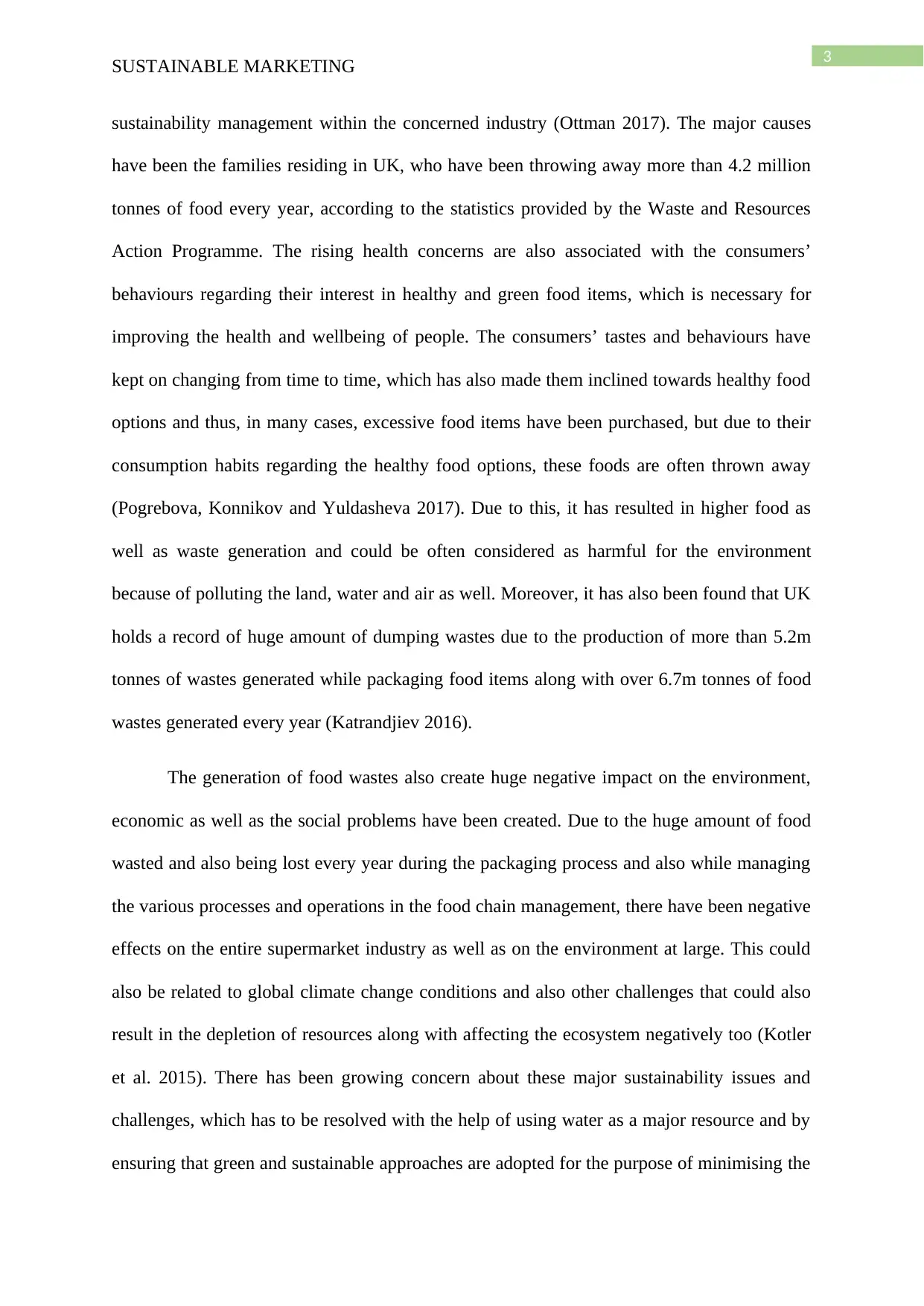
3
SUSTAINABLE MARKETING
sustainability management within the concerned industry (Ottman 2017). The major causes
have been the families residing in UK, who have been throwing away more than 4.2 million
tonnes of food every year, according to the statistics provided by the Waste and Resources
Action Programme. The rising health concerns are also associated with the consumers’
behaviours regarding their interest in healthy and green food items, which is necessary for
improving the health and wellbeing of people. The consumers’ tastes and behaviours have
kept on changing from time to time, which has also made them inclined towards healthy food
options and thus, in many cases, excessive food items have been purchased, but due to their
consumption habits regarding the healthy food options, these foods are often thrown away
(Pogrebova, Konnikov and Yuldasheva 2017). Due to this, it has resulted in higher food as
well as waste generation and could be often considered as harmful for the environment
because of polluting the land, water and air as well. Moreover, it has also been found that UK
holds a record of huge amount of dumping wastes due to the production of more than 5.2m
tonnes of wastes generated while packaging food items along with over 6.7m tonnes of food
wastes generated every year (Katrandjiev 2016).
The generation of food wastes also create huge negative impact on the environment,
economic as well as the social problems have been created. Due to the huge amount of food
wasted and also being lost every year during the packaging process and also while managing
the various processes and operations in the food chain management, there have been negative
effects on the entire supermarket industry as well as on the environment at large. This could
also be related to global climate change conditions and also other challenges that could also
result in the depletion of resources along with affecting the ecosystem negatively too (Kotler
et al. 2015). There has been growing concern about these major sustainability issues and
challenges, which has to be resolved with the help of using water as a major resource and by
ensuring that green and sustainable approaches are adopted for the purpose of minimising the
SUSTAINABLE MARKETING
sustainability management within the concerned industry (Ottman 2017). The major causes
have been the families residing in UK, who have been throwing away more than 4.2 million
tonnes of food every year, according to the statistics provided by the Waste and Resources
Action Programme. The rising health concerns are also associated with the consumers’
behaviours regarding their interest in healthy and green food items, which is necessary for
improving the health and wellbeing of people. The consumers’ tastes and behaviours have
kept on changing from time to time, which has also made them inclined towards healthy food
options and thus, in many cases, excessive food items have been purchased, but due to their
consumption habits regarding the healthy food options, these foods are often thrown away
(Pogrebova, Konnikov and Yuldasheva 2017). Due to this, it has resulted in higher food as
well as waste generation and could be often considered as harmful for the environment
because of polluting the land, water and air as well. Moreover, it has also been found that UK
holds a record of huge amount of dumping wastes due to the production of more than 5.2m
tonnes of wastes generated while packaging food items along with over 6.7m tonnes of food
wastes generated every year (Katrandjiev 2016).
The generation of food wastes also create huge negative impact on the environment,
economic as well as the social problems have been created. Due to the huge amount of food
wasted and also being lost every year during the packaging process and also while managing
the various processes and operations in the food chain management, there have been negative
effects on the entire supermarket industry as well as on the environment at large. This could
also be related to global climate change conditions and also other challenges that could also
result in the depletion of resources along with affecting the ecosystem negatively too (Kotler
et al. 2015). There has been growing concern about these major sustainability issues and
challenges, which has to be resolved with the help of using water as a major resource and by
ensuring that green and sustainable approaches are adopted for the purpose of minimising the
Paraphrase This Document
Need a fresh take? Get an instant paraphrase of this document with our AI Paraphraser

4
SUSTAINABLE MARKETING
amount of food wastes. Not only does this food waste issue is a matter of major concern
related to the pollution, but also the use of plastic bags for packaging purposes is also
considered as a major problem experienced within the supermarket industry (Zeriti et al.
2014).
While the food wastes generated resulted in severe environmental impacts such as the
landfills causing methane gas and resulted in emissions of greenhouse gases, which can
pollute the environment as well as harm the ecological balance in nature. On the other hand,
the use of plastics for the products’ packaging purposes within the supermarket industry has
generated plastic wastes, thereby, resulted in reaching a critical point where the general
public has been affected due to pollution. Once the products are bought from the
supermarket, the packaging is removed and plastics are thrown here and there, which could
be considered as a major factor that ensured global shift by polluting the land, water and even
air (Lacoste 2016). Many of the aquatic animals are affected and also the plastics have
created pollution, which contribute to the negative impact on the environment and
community furthermore. Therefore, these are the sustainability issues and challenges that
have been experienced by the business organisations within the supermarket industry. Both
these sustainability issues are not only associated with the environmental problems, but also
has been related to the social and economic issues, which represent a huge amount of food
being wasted every year along with the plastic packaging and non-consumable materials
affecting the food chain, therefore, affecting the consumers, environment, the business as
well as the entire supermarket industry in United Kingdom (Brindley and Oxborrow 2014).
This has caused pollution and also results in climatic change problems that can affect the
entire ecosystem as well as deplete the resources, which are needed to be dealt with through
urgent priority.
SUSTAINABLE MARKETING
amount of food wastes. Not only does this food waste issue is a matter of major concern
related to the pollution, but also the use of plastic bags for packaging purposes is also
considered as a major problem experienced within the supermarket industry (Zeriti et al.
2014).
While the food wastes generated resulted in severe environmental impacts such as the
landfills causing methane gas and resulted in emissions of greenhouse gases, which can
pollute the environment as well as harm the ecological balance in nature. On the other hand,
the use of plastics for the products’ packaging purposes within the supermarket industry has
generated plastic wastes, thereby, resulted in reaching a critical point where the general
public has been affected due to pollution. Once the products are bought from the
supermarket, the packaging is removed and plastics are thrown here and there, which could
be considered as a major factor that ensured global shift by polluting the land, water and even
air (Lacoste 2016). Many of the aquatic animals are affected and also the plastics have
created pollution, which contribute to the negative impact on the environment and
community furthermore. Therefore, these are the sustainability issues and challenges that
have been experienced by the business organisations within the supermarket industry. Both
these sustainability issues are not only associated with the environmental problems, but also
has been related to the social and economic issues, which represent a huge amount of food
being wasted every year along with the plastic packaging and non-consumable materials
affecting the food chain, therefore, affecting the consumers, environment, the business as
well as the entire supermarket industry in United Kingdom (Brindley and Oxborrow 2014).
This has caused pollution and also results in climatic change problems that can affect the
entire ecosystem as well as deplete the resources, which are needed to be dealt with through
urgent priority.
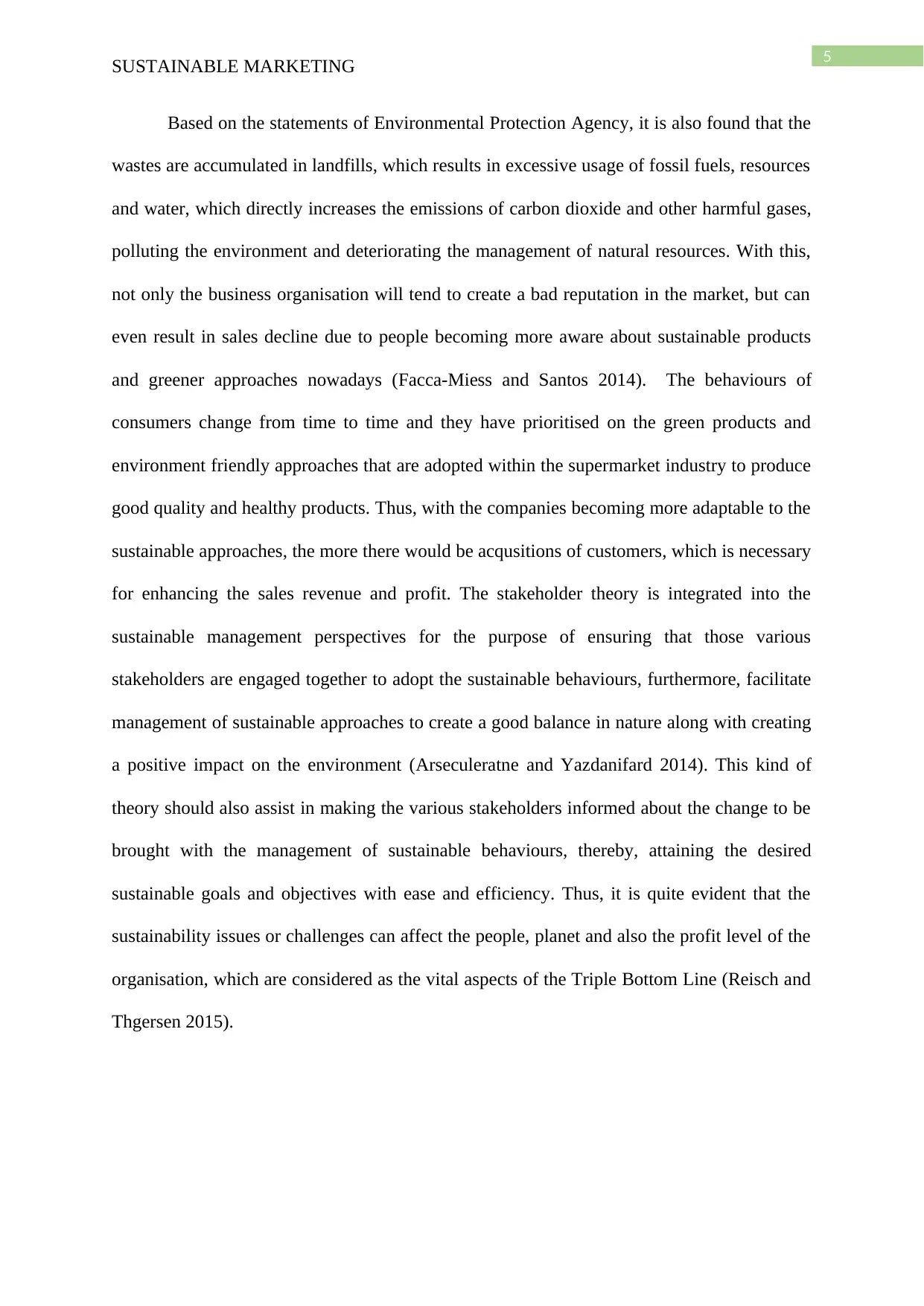
5
SUSTAINABLE MARKETING
Based on the statements of Environmental Protection Agency, it is also found that the
wastes are accumulated in landfills, which results in excessive usage of fossil fuels, resources
and water, which directly increases the emissions of carbon dioxide and other harmful gases,
polluting the environment and deteriorating the management of natural resources. With this,
not only the business organisation will tend to create a bad reputation in the market, but can
even result in sales decline due to people becoming more aware about sustainable products
and greener approaches nowadays (Facca-Miess and Santos 2014). The behaviours of
consumers change from time to time and they have prioritised on the green products and
environment friendly approaches that are adopted within the supermarket industry to produce
good quality and healthy products. Thus, with the companies becoming more adaptable to the
sustainable approaches, the more there would be acqusitions of customers, which is necessary
for enhancing the sales revenue and profit. The stakeholder theory is integrated into the
sustainable management perspectives for the purpose of ensuring that those various
stakeholders are engaged together to adopt the sustainable behaviours, furthermore, facilitate
management of sustainable approaches to create a good balance in nature along with creating
a positive impact on the environment (Arseculeratne and Yazdanifard 2014). This kind of
theory should also assist in making the various stakeholders informed about the change to be
brought with the management of sustainable behaviours, thereby, attaining the desired
sustainable goals and objectives with ease and efficiency. Thus, it is quite evident that the
sustainability issues or challenges can affect the people, planet and also the profit level of the
organisation, which are considered as the vital aspects of the Triple Bottom Line (Reisch and
Thgersen 2015).
SUSTAINABLE MARKETING
Based on the statements of Environmental Protection Agency, it is also found that the
wastes are accumulated in landfills, which results in excessive usage of fossil fuels, resources
and water, which directly increases the emissions of carbon dioxide and other harmful gases,
polluting the environment and deteriorating the management of natural resources. With this,
not only the business organisation will tend to create a bad reputation in the market, but can
even result in sales decline due to people becoming more aware about sustainable products
and greener approaches nowadays (Facca-Miess and Santos 2014). The behaviours of
consumers change from time to time and they have prioritised on the green products and
environment friendly approaches that are adopted within the supermarket industry to produce
good quality and healthy products. Thus, with the companies becoming more adaptable to the
sustainable approaches, the more there would be acqusitions of customers, which is necessary
for enhancing the sales revenue and profit. The stakeholder theory is integrated into the
sustainable management perspectives for the purpose of ensuring that those various
stakeholders are engaged together to adopt the sustainable behaviours, furthermore, facilitate
management of sustainable approaches to create a good balance in nature along with creating
a positive impact on the environment (Arseculeratne and Yazdanifard 2014). This kind of
theory should also assist in making the various stakeholders informed about the change to be
brought with the management of sustainable behaviours, thereby, attaining the desired
sustainable goals and objectives with ease and efficiency. Thus, it is quite evident that the
sustainability issues or challenges can affect the people, planet and also the profit level of the
organisation, which are considered as the vital aspects of the Triple Bottom Line (Reisch and
Thgersen 2015).
⊘ This is a preview!⊘
Do you want full access?
Subscribe today to unlock all pages.

Trusted by 1+ million students worldwide
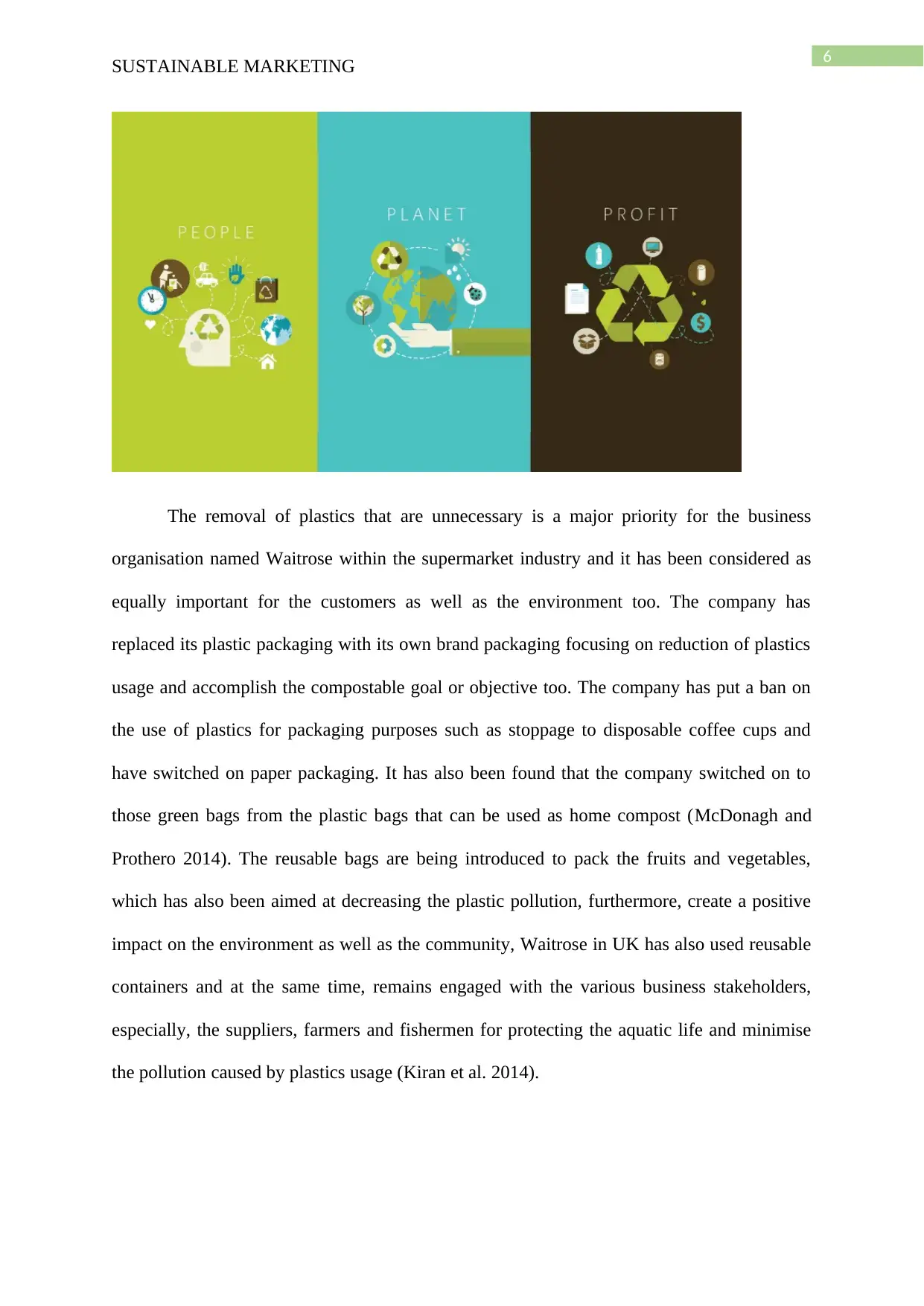
6
SUSTAINABLE MARKETING
The removal of plastics that are unnecessary is a major priority for the business
organisation named Waitrose within the supermarket industry and it has been considered as
equally important for the customers as well as the environment too. The company has
replaced its plastic packaging with its own brand packaging focusing on reduction of plastics
usage and accomplish the compostable goal or objective too. The company has put a ban on
the use of plastics for packaging purposes such as stoppage to disposable coffee cups and
have switched on paper packaging. It has also been found that the company switched on to
those green bags from the plastic bags that can be used as home compost (McDonagh and
Prothero 2014). The reusable bags are being introduced to pack the fruits and vegetables,
which has also been aimed at decreasing the plastic pollution, furthermore, create a positive
impact on the environment as well as the community, Waitrose in UK has also used reusable
containers and at the same time, remains engaged with the various business stakeholders,
especially, the suppliers, farmers and fishermen for protecting the aquatic life and minimise
the pollution caused by plastics usage (Kiran et al. 2014).
SUSTAINABLE MARKETING
The removal of plastics that are unnecessary is a major priority for the business
organisation named Waitrose within the supermarket industry and it has been considered as
equally important for the customers as well as the environment too. The company has
replaced its plastic packaging with its own brand packaging focusing on reduction of plastics
usage and accomplish the compostable goal or objective too. The company has put a ban on
the use of plastics for packaging purposes such as stoppage to disposable coffee cups and
have switched on paper packaging. It has also been found that the company switched on to
those green bags from the plastic bags that can be used as home compost (McDonagh and
Prothero 2014). The reusable bags are being introduced to pack the fruits and vegetables,
which has also been aimed at decreasing the plastic pollution, furthermore, create a positive
impact on the environment as well as the community, Waitrose in UK has also used reusable
containers and at the same time, remains engaged with the various business stakeholders,
especially, the suppliers, farmers and fishermen for protecting the aquatic life and minimise
the pollution caused by plastics usage (Kiran et al. 2014).
Paraphrase This Document
Need a fresh take? Get an instant paraphrase of this document with our AI Paraphraser
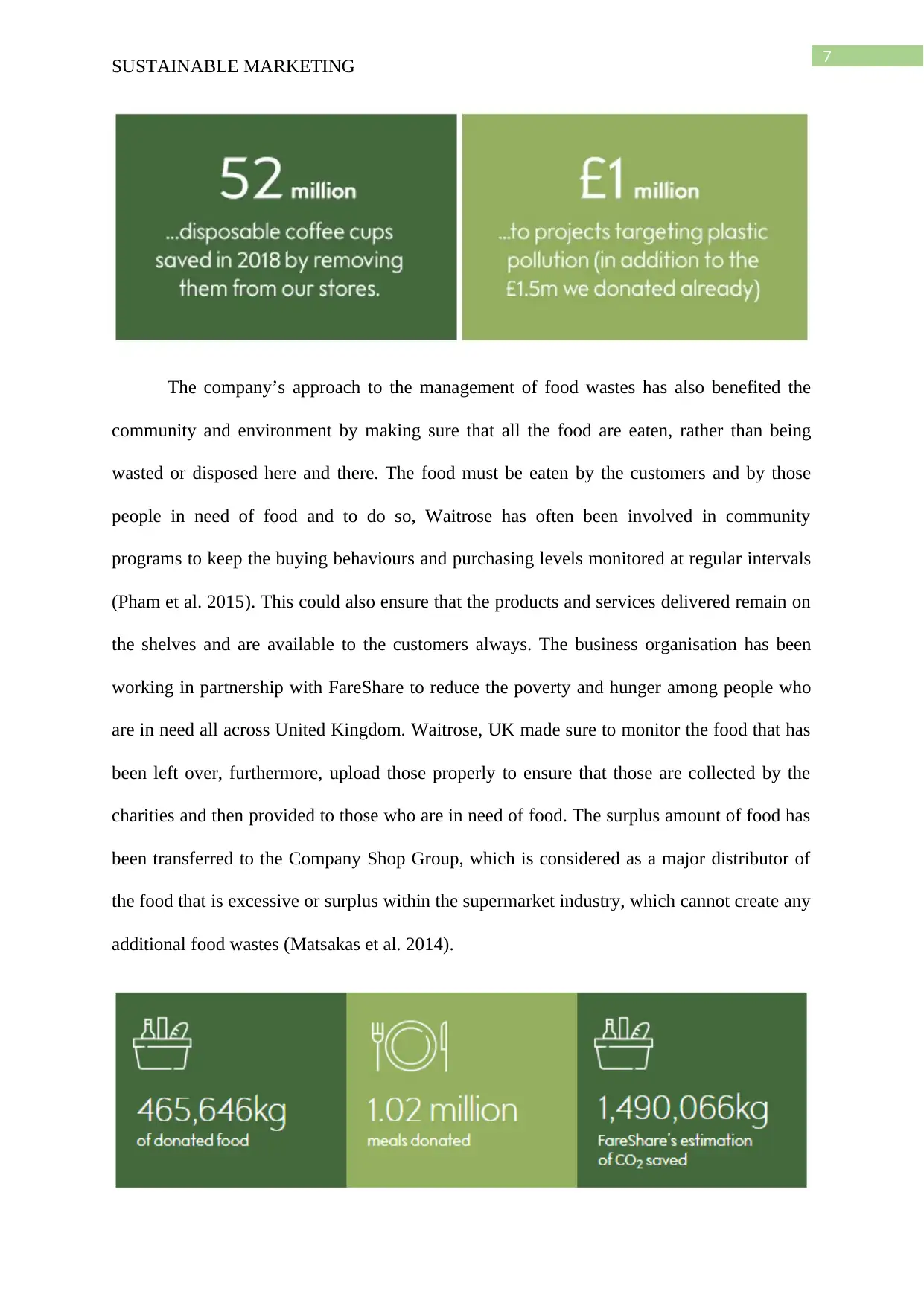
7
SUSTAINABLE MARKETING
The company’s approach to the management of food wastes has also benefited the
community and environment by making sure that all the food are eaten, rather than being
wasted or disposed here and there. The food must be eaten by the customers and by those
people in need of food and to do so, Waitrose has often been involved in community
programs to keep the buying behaviours and purchasing levels monitored at regular intervals
(Pham et al. 2015). This could also ensure that the products and services delivered remain on
the shelves and are available to the customers always. The business organisation has been
working in partnership with FareShare to reduce the poverty and hunger among people who
are in need all across United Kingdom. Waitrose, UK made sure to monitor the food that has
been left over, furthermore, upload those properly to ensure that those are collected by the
charities and then provided to those who are in need of food. The surplus amount of food has
been transferred to the Company Shop Group, which is considered as a major distributor of
the food that is excessive or surplus within the supermarket industry, which cannot create any
additional food wastes (Matsakas et al. 2014).
SUSTAINABLE MARKETING
The company’s approach to the management of food wastes has also benefited the
community and environment by making sure that all the food are eaten, rather than being
wasted or disposed here and there. The food must be eaten by the customers and by those
people in need of food and to do so, Waitrose has often been involved in community
programs to keep the buying behaviours and purchasing levels monitored at regular intervals
(Pham et al. 2015). This could also ensure that the products and services delivered remain on
the shelves and are available to the customers always. The business organisation has been
working in partnership with FareShare to reduce the poverty and hunger among people who
are in need all across United Kingdom. Waitrose, UK made sure to monitor the food that has
been left over, furthermore, upload those properly to ensure that those are collected by the
charities and then provided to those who are in need of food. The surplus amount of food has
been transferred to the Company Shop Group, which is considered as a major distributor of
the food that is excessive or surplus within the supermarket industry, which cannot create any
additional food wastes (Matsakas et al. 2014).
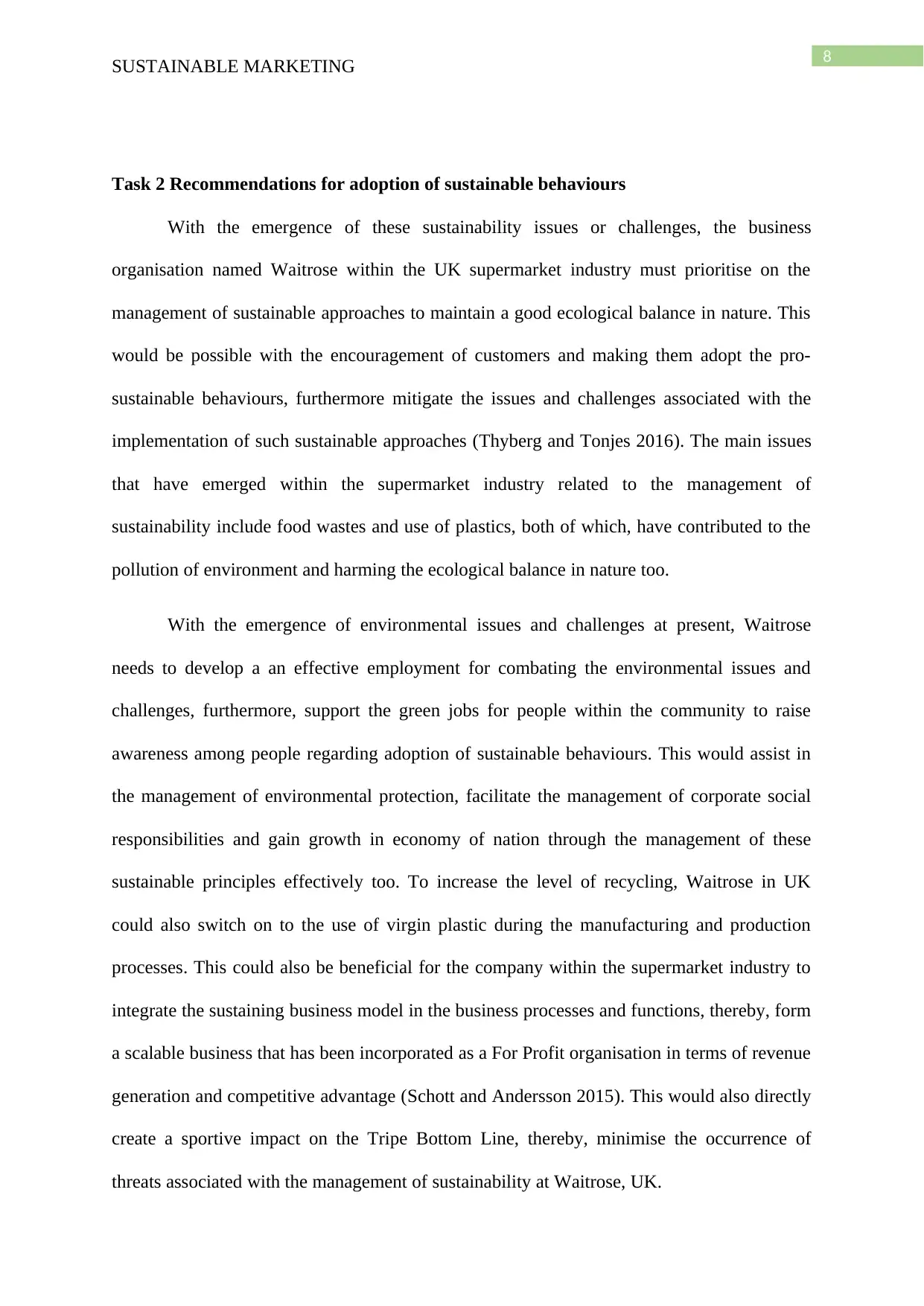
8
SUSTAINABLE MARKETING
Task 2 Recommendations for adoption of sustainable behaviours
With the emergence of these sustainability issues or challenges, the business
organisation named Waitrose within the UK supermarket industry must prioritise on the
management of sustainable approaches to maintain a good ecological balance in nature. This
would be possible with the encouragement of customers and making them adopt the pro-
sustainable behaviours, furthermore mitigate the issues and challenges associated with the
implementation of such sustainable approaches (Thyberg and Tonjes 2016). The main issues
that have emerged within the supermarket industry related to the management of
sustainability include food wastes and use of plastics, both of which, have contributed to the
pollution of environment and harming the ecological balance in nature too.
With the emergence of environmental issues and challenges at present, Waitrose
needs to develop a an effective employment for combating the environmental issues and
challenges, furthermore, support the green jobs for people within the community to raise
awareness among people regarding adoption of sustainable behaviours. This would assist in
the management of environmental protection, facilitate the management of corporate social
responsibilities and gain growth in economy of nation through the management of these
sustainable principles effectively too. To increase the level of recycling, Waitrose in UK
could also switch on to the use of virgin plastic during the manufacturing and production
processes. This could also be beneficial for the company within the supermarket industry to
integrate the sustaining business model in the business processes and functions, thereby, form
a scalable business that has been incorporated as a For Profit organisation in terms of revenue
generation and competitive advantage (Schott and Andersson 2015). This would also directly
create a sportive impact on the Tripe Bottom Line, thereby, minimise the occurrence of
threats associated with the management of sustainability at Waitrose, UK.
SUSTAINABLE MARKETING
Task 2 Recommendations for adoption of sustainable behaviours
With the emergence of these sustainability issues or challenges, the business
organisation named Waitrose within the UK supermarket industry must prioritise on the
management of sustainable approaches to maintain a good ecological balance in nature. This
would be possible with the encouragement of customers and making them adopt the pro-
sustainable behaviours, furthermore mitigate the issues and challenges associated with the
implementation of such sustainable approaches (Thyberg and Tonjes 2016). The main issues
that have emerged within the supermarket industry related to the management of
sustainability include food wastes and use of plastics, both of which, have contributed to the
pollution of environment and harming the ecological balance in nature too.
With the emergence of environmental issues and challenges at present, Waitrose
needs to develop a an effective employment for combating the environmental issues and
challenges, furthermore, support the green jobs for people within the community to raise
awareness among people regarding adoption of sustainable behaviours. This would assist in
the management of environmental protection, facilitate the management of corporate social
responsibilities and gain growth in economy of nation through the management of these
sustainable principles effectively too. To increase the level of recycling, Waitrose in UK
could also switch on to the use of virgin plastic during the manufacturing and production
processes. This could also be beneficial for the company within the supermarket industry to
integrate the sustaining business model in the business processes and functions, thereby, form
a scalable business that has been incorporated as a For Profit organisation in terms of revenue
generation and competitive advantage (Schott and Andersson 2015). This would also directly
create a sportive impact on the Tripe Bottom Line, thereby, minimise the occurrence of
threats associated with the management of sustainability at Waitrose, UK.
⊘ This is a preview!⊘
Do you want full access?
Subscribe today to unlock all pages.

Trusted by 1+ million students worldwide
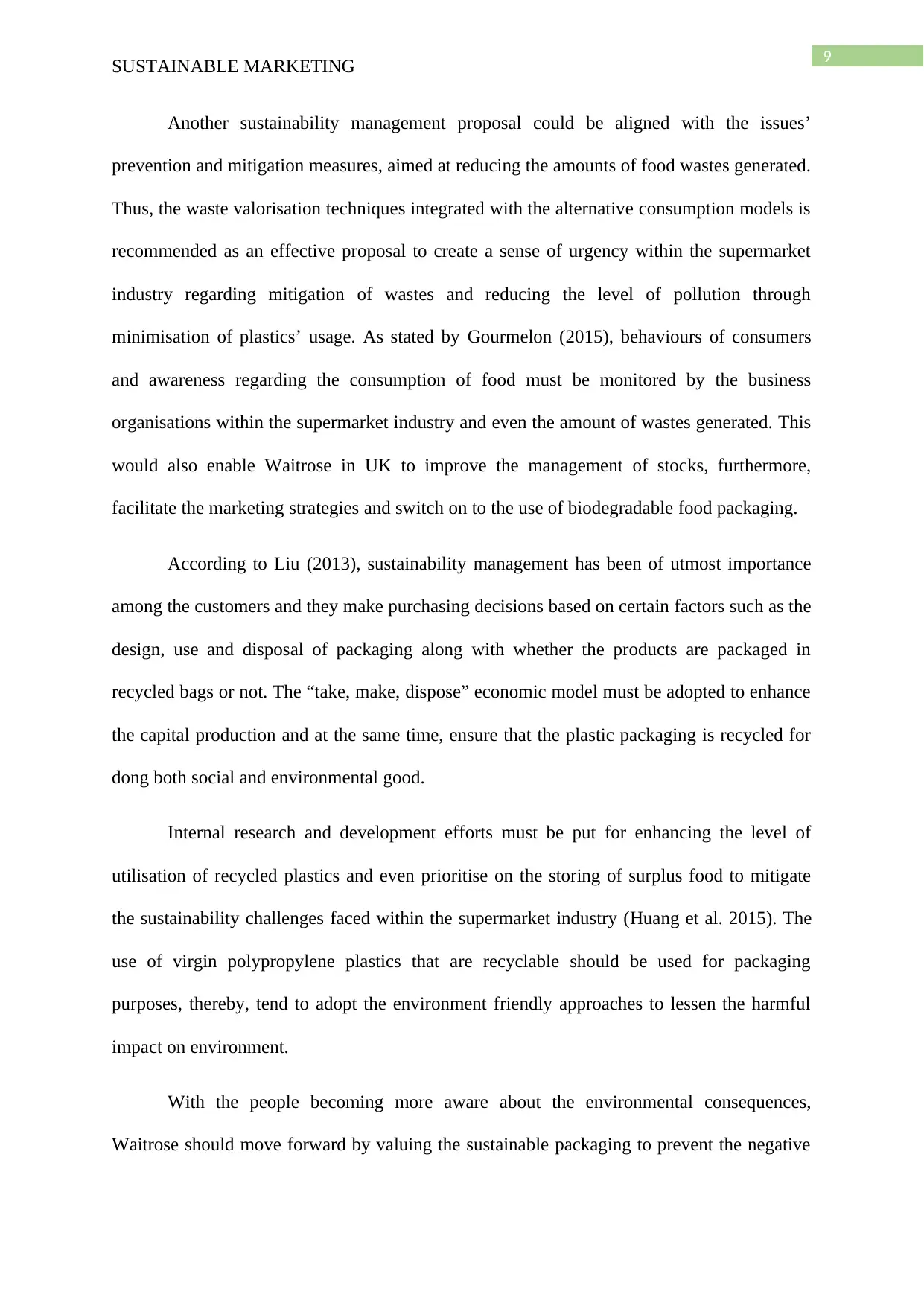
9
SUSTAINABLE MARKETING
Another sustainability management proposal could be aligned with the issues’
prevention and mitigation measures, aimed at reducing the amounts of food wastes generated.
Thus, the waste valorisation techniques integrated with the alternative consumption models is
recommended as an effective proposal to create a sense of urgency within the supermarket
industry regarding mitigation of wastes and reducing the level of pollution through
minimisation of plastics’ usage. As stated by Gourmelon (2015), behaviours of consumers
and awareness regarding the consumption of food must be monitored by the business
organisations within the supermarket industry and even the amount of wastes generated. This
would also enable Waitrose in UK to improve the management of stocks, furthermore,
facilitate the marketing strategies and switch on to the use of biodegradable food packaging.
According to Liu (2013), sustainability management has been of utmost importance
among the customers and they make purchasing decisions based on certain factors such as the
design, use and disposal of packaging along with whether the products are packaged in
recycled bags or not. The “take, make, dispose” economic model must be adopted to enhance
the capital production and at the same time, ensure that the plastic packaging is recycled for
dong both social and environmental good.
Internal research and development efforts must be put for enhancing the level of
utilisation of recycled plastics and even prioritise on the storing of surplus food to mitigate
the sustainability challenges faced within the supermarket industry (Huang et al. 2015). The
use of virgin polypropylene plastics that are recyclable should be used for packaging
purposes, thereby, tend to adopt the environment friendly approaches to lessen the harmful
impact on environment.
With the people becoming more aware about the environmental consequences,
Waitrose should move forward by valuing the sustainable packaging to prevent the negative
SUSTAINABLE MARKETING
Another sustainability management proposal could be aligned with the issues’
prevention and mitigation measures, aimed at reducing the amounts of food wastes generated.
Thus, the waste valorisation techniques integrated with the alternative consumption models is
recommended as an effective proposal to create a sense of urgency within the supermarket
industry regarding mitigation of wastes and reducing the level of pollution through
minimisation of plastics’ usage. As stated by Gourmelon (2015), behaviours of consumers
and awareness regarding the consumption of food must be monitored by the business
organisations within the supermarket industry and even the amount of wastes generated. This
would also enable Waitrose in UK to improve the management of stocks, furthermore,
facilitate the marketing strategies and switch on to the use of biodegradable food packaging.
According to Liu (2013), sustainability management has been of utmost importance
among the customers and they make purchasing decisions based on certain factors such as the
design, use and disposal of packaging along with whether the products are packaged in
recycled bags or not. The “take, make, dispose” economic model must be adopted to enhance
the capital production and at the same time, ensure that the plastic packaging is recycled for
dong both social and environmental good.
Internal research and development efforts must be put for enhancing the level of
utilisation of recycled plastics and even prioritise on the storing of surplus food to mitigate
the sustainability challenges faced within the supermarket industry (Huang et al. 2015). The
use of virgin polypropylene plastics that are recyclable should be used for packaging
purposes, thereby, tend to adopt the environment friendly approaches to lessen the harmful
impact on environment.
With the people becoming more aware about the environmental consequences,
Waitrose should move forward by valuing the sustainable packaging to prevent the negative
Paraphrase This Document
Need a fresh take? Get an instant paraphrase of this document with our AI Paraphraser
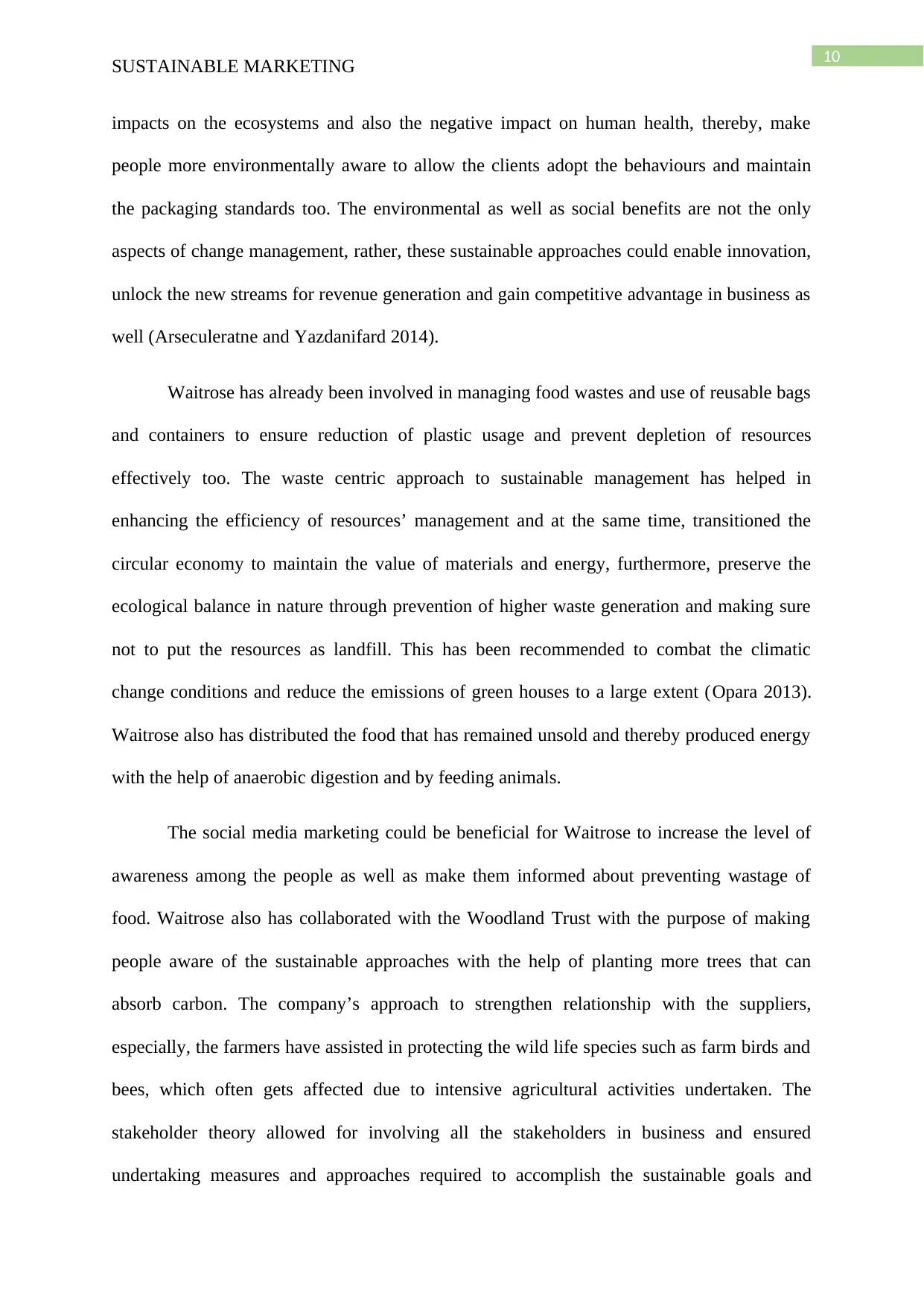
10
SUSTAINABLE MARKETING
impacts on the ecosystems and also the negative impact on human health, thereby, make
people more environmentally aware to allow the clients adopt the behaviours and maintain
the packaging standards too. The environmental as well as social benefits are not the only
aspects of change management, rather, these sustainable approaches could enable innovation,
unlock the new streams for revenue generation and gain competitive advantage in business as
well (Arseculeratne and Yazdanifard 2014).
Waitrose has already been involved in managing food wastes and use of reusable bags
and containers to ensure reduction of plastic usage and prevent depletion of resources
effectively too. The waste centric approach to sustainable management has helped in
enhancing the efficiency of resources’ management and at the same time, transitioned the
circular economy to maintain the value of materials and energy, furthermore, preserve the
ecological balance in nature through prevention of higher waste generation and making sure
not to put the resources as landfill. This has been recommended to combat the climatic
change conditions and reduce the emissions of green houses to a large extent (Opara 2013).
Waitrose also has distributed the food that has remained unsold and thereby produced energy
with the help of anaerobic digestion and by feeding animals.
The social media marketing could be beneficial for Waitrose to increase the level of
awareness among the people as well as make them informed about preventing wastage of
food. Waitrose also has collaborated with the Woodland Trust with the purpose of making
people aware of the sustainable approaches with the help of planting more trees that can
absorb carbon. The company’s approach to strengthen relationship with the suppliers,
especially, the farmers have assisted in protecting the wild life species such as farm birds and
bees, which often gets affected due to intensive agricultural activities undertaken. The
stakeholder theory allowed for involving all the stakeholders in business and ensured
undertaking measures and approaches required to accomplish the sustainable goals and
SUSTAINABLE MARKETING
impacts on the ecosystems and also the negative impact on human health, thereby, make
people more environmentally aware to allow the clients adopt the behaviours and maintain
the packaging standards too. The environmental as well as social benefits are not the only
aspects of change management, rather, these sustainable approaches could enable innovation,
unlock the new streams for revenue generation and gain competitive advantage in business as
well (Arseculeratne and Yazdanifard 2014).
Waitrose has already been involved in managing food wastes and use of reusable bags
and containers to ensure reduction of plastic usage and prevent depletion of resources
effectively too. The waste centric approach to sustainable management has helped in
enhancing the efficiency of resources’ management and at the same time, transitioned the
circular economy to maintain the value of materials and energy, furthermore, preserve the
ecological balance in nature through prevention of higher waste generation and making sure
not to put the resources as landfill. This has been recommended to combat the climatic
change conditions and reduce the emissions of green houses to a large extent (Opara 2013).
Waitrose also has distributed the food that has remained unsold and thereby produced energy
with the help of anaerobic digestion and by feeding animals.
The social media marketing could be beneficial for Waitrose to increase the level of
awareness among the people as well as make them informed about preventing wastage of
food. Waitrose also has collaborated with the Woodland Trust with the purpose of making
people aware of the sustainable approaches with the help of planting more trees that can
absorb carbon. The company’s approach to strengthen relationship with the suppliers,
especially, the farmers have assisted in protecting the wild life species such as farm birds and
bees, which often gets affected due to intensive agricultural activities undertaken. The
stakeholder theory allowed for involving all the stakeholders in business and ensured
undertaking measures and approaches required to accomplish the sustainable goals and
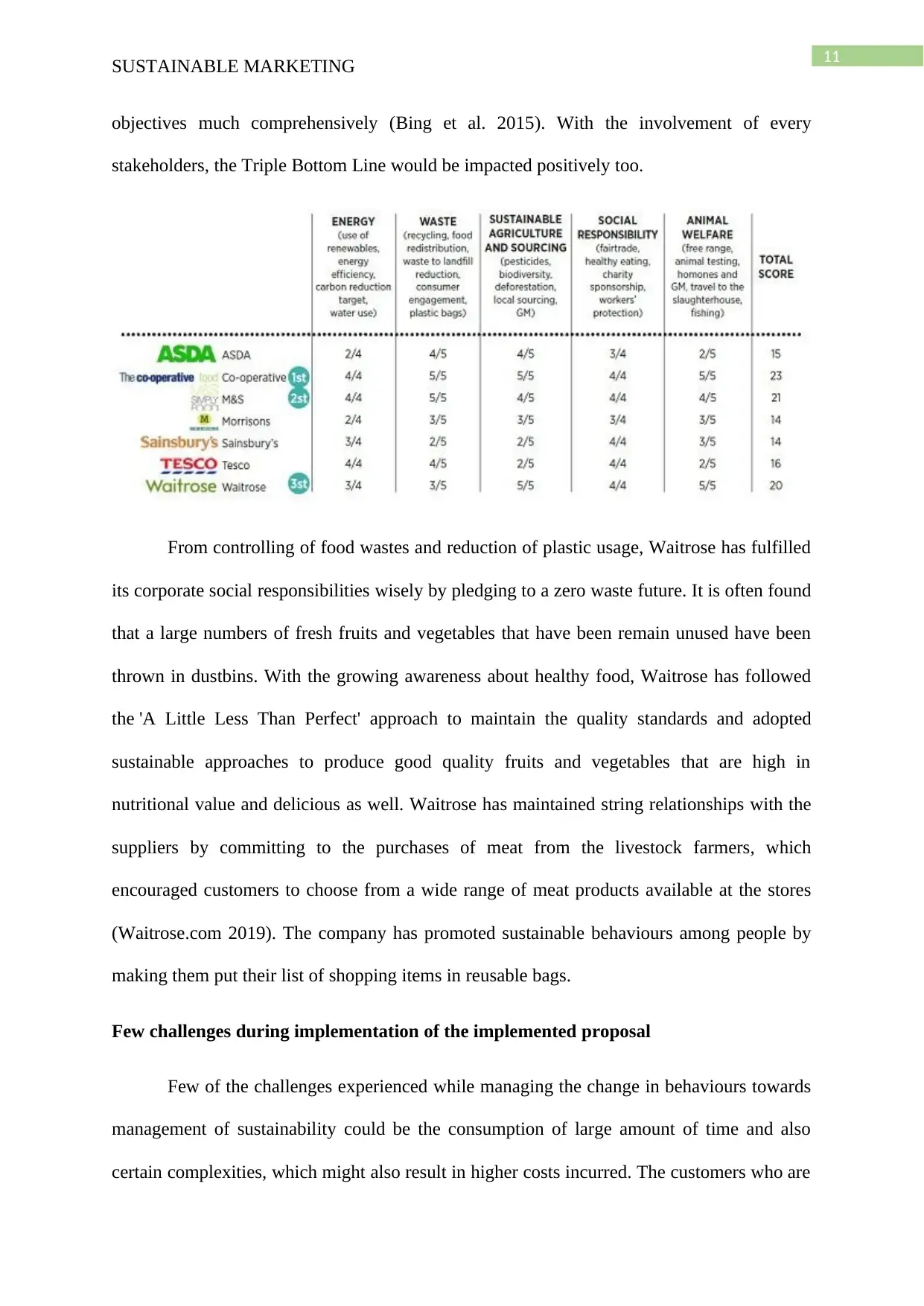
11
SUSTAINABLE MARKETING
objectives much comprehensively (Bing et al. 2015). With the involvement of every
stakeholders, the Triple Bottom Line would be impacted positively too.
From controlling of food wastes and reduction of plastic usage, Waitrose has fulfilled
its corporate social responsibilities wisely by pledging to a zero waste future. It is often found
that a large numbers of fresh fruits and vegetables that have been remain unused have been
thrown in dustbins. With the growing awareness about healthy food, Waitrose has followed
the 'A Little Less Than Perfect' approach to maintain the quality standards and adopted
sustainable approaches to produce good quality fruits and vegetables that are high in
nutritional value and delicious as well. Waitrose has maintained string relationships with the
suppliers by committing to the purchases of meat from the livestock farmers, which
encouraged customers to choose from a wide range of meat products available at the stores
(Waitrose.com 2019). The company has promoted sustainable behaviours among people by
making them put their list of shopping items in reusable bags.
Few challenges during implementation of the implemented proposal
Few of the challenges experienced while managing the change in behaviours towards
management of sustainability could be the consumption of large amount of time and also
certain complexities, which might also result in higher costs incurred. The customers who are
SUSTAINABLE MARKETING
objectives much comprehensively (Bing et al. 2015). With the involvement of every
stakeholders, the Triple Bottom Line would be impacted positively too.
From controlling of food wastes and reduction of plastic usage, Waitrose has fulfilled
its corporate social responsibilities wisely by pledging to a zero waste future. It is often found
that a large numbers of fresh fruits and vegetables that have been remain unused have been
thrown in dustbins. With the growing awareness about healthy food, Waitrose has followed
the 'A Little Less Than Perfect' approach to maintain the quality standards and adopted
sustainable approaches to produce good quality fruits and vegetables that are high in
nutritional value and delicious as well. Waitrose has maintained string relationships with the
suppliers by committing to the purchases of meat from the livestock farmers, which
encouraged customers to choose from a wide range of meat products available at the stores
(Waitrose.com 2019). The company has promoted sustainable behaviours among people by
making them put their list of shopping items in reusable bags.
Few challenges during implementation of the implemented proposal
Few of the challenges experienced while managing the change in behaviours towards
management of sustainability could be the consumption of large amount of time and also
certain complexities, which might also result in higher costs incurred. The customers who are
⊘ This is a preview!⊘
Do you want full access?
Subscribe today to unlock all pages.

Trusted by 1+ million students worldwide
1 out of 16
Related Documents
Your All-in-One AI-Powered Toolkit for Academic Success.
+13062052269
info@desklib.com
Available 24*7 on WhatsApp / Email
![[object Object]](/_next/static/media/star-bottom.7253800d.svg)
Unlock your academic potential
Copyright © 2020–2026 A2Z Services. All Rights Reserved. Developed and managed by ZUCOL.





